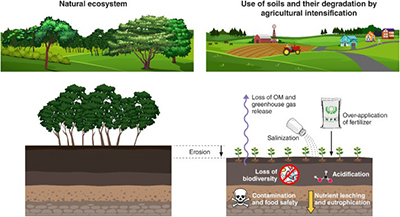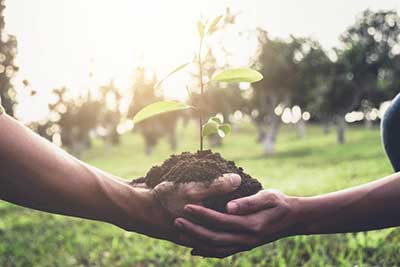Relevance: GS-3: Biodiversity, Environment, Security and Disaster Management
Key Phrases: sustainable food production, soil degradation, civilizational ethos, salinization, chemical pesticides, Food and Agriculture Organization.
Context:
- Soil degradation on an unprecedented scale is a significant challenge to sustainable food production.
- About one-third of the earth’s soils are already degraded and alarmingly, about 90 per cent could be degraded by 2050 if no corrective action is taken.
Do you know?
- Sikkim in India, became the first organic state in the world.
- The small northeast Indian state has succeeded in phasing out chemical pesticides and fertilizers gradually but resolutely and has converted the entire state to organic agriculture.
Soil Degradation:
- Soil degradation is the decline in soil condition caused by its improper use or poor management, usually for agricultural, industrial or urban purposes.

Impact of Soil Degradation:
- Water Scarcity:
- Depleted soils cannot absorb and regulate water flows.
- Lack of water retention leads to water scarcity, droughts & floods.
- Organic matter can hold up to 90% of its weight in water and release it slowly over time. This is a big help in drought-prone areas.
- Loss of Biodiversity:
- Scientists say that around 27000 species of life forms are becoming extinct every year due to loss of habitat.
- The crisis has reached a point where 80% of the insect biomass has gone.
- Loss of biodiversity further disrupts the soil habitat and prevents soil regeneration.
- Climate Change:
- Carbon stored in soil is 3 times more than that found in living plants, and 2 times more that in the atmosphere, which means soil is crucial for carbon sequestration.
- If the world's soils are not revitalized, they could release 850 billion tonnes of carbon dioxide into the atmosphere contributing to climate change. This is more than all of humanity's emissions in the last 30 years combined.
- Loss of Livelihood:
- 74% of the poor are directly affected by land degradation globally.
- It is estimated that soil extinction is costing the world up to US$ 10.6 trillion every year.
- Conflict and Migration:
- Population growth, and food and water scarcity could cause over 1 billion to migrate to other regions and countries by 2050.
- Land issues have played a significant role in over 90% of major wars and conflicts in Africa since 1990.
- From the French Revolution to the Arab Spring, high food prices have been cited as a factor behind mass protest movements.
Relation Between Soil health and food production:
- Food security is one of the core indicators of economic development. The modernization of agriculture has brought huge dividends in terms of ensuring food security to large swathes of people, apart from improving crop production.
- A key element of sustainable food production is healthy soil because nearly 95 per cent of global food production depends on soil. The current status of soil health is worrisome.
- While soil degradation is believed to be occurring in 145 million hectares in India, it is estimated that 96.40 million hectares about 30 per cent of the total geographical area is affected by land degradation.
- Globally, the biophysical status of 5,670 million hectares of land is declining, of which 1,660 million hectares (29 per cent) is attributed to human-induced land degradation, according to the Food and Agriculture Organization’s ‘State of Land, Soil and Water’ report.
How to Prevent Soil Degradation:
- Stopping Soil Erosion via Sustainable Farming Practices
- Regenerative agriculture techniques have the potential to preserve and restore ecosystems and habitats and improve the quality and health of the soil.
- Protecting the Soil by Planting Windbreaks
- Windbreaks are linear plantings of shrubs and trees with the goal of improving crop production, protect the soil, people, and livestock.
- According to FAO, windbreaks can reduce wind velocities for a distance approximately 15 times the height of the tallest trees.
- As a result, there is a lower rate of soil loss across large crop areas.
- Stone Walls to Prevent Soil Erosion
- The sediments accumulating behind the dry-stone walls create suitable land for farming and prevent soil erosion.
- Conservation Tillage and Soil Erosion
- Conservation tillage is any form of tillage that minimizes the number of tillage passes.
- Conservation tillage techniques have the potential to reduce the vertical movements of soil.
- In this way, more crop residues are left on the soil surface reducing the exposure to water or wind erosion.

Various schemes to save soil:
- Rashtriya Krishi Vigyan Yojana (RKVY)
- The thrust area is to protect the loss of topsoil, improving soil fertility, enhancing crop production, land and water productivity of watershed areas comprising of wastelands, river valleys and the eco-system as a whole.
- The programme is implemented with the Department of Agriculture as the Nodal Agency.
- Accelerated Irrigation Benefits Programme (AIBP)
- The main thrust of the programme is to increase the area under irrigation thereby increasing the productivity of the area and improving the socio-economic condition of the people.
- Soil Health Card Scheme:
- It is a Government of India's scheme promoted by the Department of Agriculture & Co-operation under the Ministry of Agriculture and Farmers' Welfare.
- A Soil Health Card is used to assess the current status of soil health and, when used over time, to determine changes in soil health that are affected by land management.
Conclusion:
- Soil health is a concern worldwide and affects matters of food security, environmental protection, water quality, and infrastructure.
- From ordinary folk to those in the highest positions in governments, from farmers to CEOs, from scientists to school children, everybody must join this campaign to save the health of the planet and ensure food security.
- Reversing soil degradation is vital if we want to feed a growing global population, protect biodiversity and help address the plant’s climate crisis.
Source: Indian Express
Mains Question:
Q. Without soil health there is no food security. Discuss (150 words).







